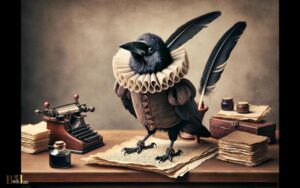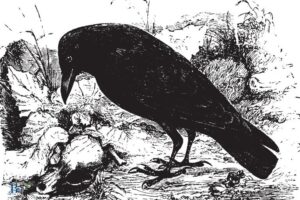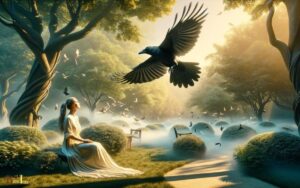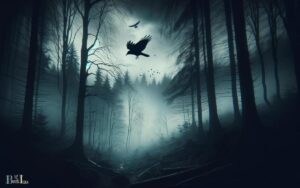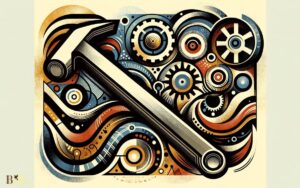What Is A John Crow? A Large Scavenger Bird!
The John Crow, more commonly known as the turkey vulture (Cathartes aura), is a scavenging bird of prey that plays an essential role in the environment by consuming carrion, thus preventing the spread of disease. It’s recognized for its large size, broad wings, and distinctive red head.
The John Crow is a species of vulture found in the Americas, from southern Canada to the southernmost tip of South America.
It is particularly noted for its scavenging habits and serves an important function in the ecosystem by cleaning up dead animal matter.
Characteristics of the John Crow include:
In Jamaica and other Caribbean cultures, the John Crow has a presence in folklore and is often associated with omens or spiritual beliefs.
Despite its grim reputation, the John Crow is a fascinating creature. Its unique role as nature’s cleanup crew highlights its importance in maintaining a healthy environment.

Key Takeaway
Origin and History of the Term
The term ‘John Crow’ has infrequently been used historically to refer to a contemptible or repugnant person.
The origin of this term can be traced back to the Jamaican Maroons, descendants of African slaves who fought for and won their freedom.
The John Crow was a scavenger bird that was often associated with death and decay. The Maroons used the term ‘John Crow’ to describe individuals who exhibited behavior that was deemed dishonorable or despicable within their community.
Over time, the term has evolved and is now used more broadly in Jamaican culture to refer to someone who is untrustworthy or dishonest.
Despite its negative connotations, the term serves as a reminder of the resilience and strength of those who fought for freedom and dignity.
Characteristics and Behavior of John Crows
Associated with scavenging behavior and a negative cultural reputation, a John Crow exhibits characteristics and behavior that are deemed dishonorable or repugnant within Jamaican culture.
These birds are known for their opportunistic feeding habits, often feeding on carrion and garbage.
They are also notorious for their bold and aggressive behavior, often encroaching on human spaces in search of food.
Their presence is often associated with death and decay, further contributing to their negative perception.
Furthermore, John Crows are known to be noisy and disruptive, with their loud calls and large gatherings causing disturbance.
These behaviors have led to them being viewed as symbols of bad omens and unpleasantness within Jamaican folklore and culture. As a result, they are often regarded with disdain and aversion by the local population.
John Crow in Jamaican Folklore and Culture
In Jamaican folklore and culture, John Crows are often depicted as symbols of bad omens and unpleasantness, reflecting their negative reputation within the local population.
This negative perception has led to the incorporation of John Crows into various aspects of Jamaican folklore and culture, including:
- Superstitions: Many Jamaicans believe that seeing a John Crow is a sign of impending death or misfortune.
- Literature and Music: John Crows are frequently referenced in Jamaican literature, music, and proverbs as harbingers of doom or as symbols of decay and death.
- Social Commentary: The negative portrayal of John Crows in Jamaican folklore and culture is often used to convey societal messages regarding the consequences of negative actions and behaviors.
These representations have cemented the John Crow’s reputation as an ominous figure in Jamaican folklore and culture.
This negative perception of John Crows also influences their role in the ecosystem.
The Role of John Crows in the Ecosystem
John Crows play a vital role in the ecosystem by scavenging and disposing of decaying organic matter.
As opportunistic feeders, they help maintain the balance of the environment by efficiently recycling nutrients.
By consuming carrion, John Crows prevent the spread of diseases and parasites that can affect other wildlife and even humans.
Additionally, their role as scavengers aids in the natural decomposition process, contributing to soil health and fertility.
Furthermore, John Crows help regulate insect populations by consuming dead insects and larvae, thereby reducing the likelihood of pest outbreaks.
Their presence in the ecosystem serves as a natural waste management system, ensuring the efficient breakdown of organic matter and the overall health of the environment.
Symbolism and Significance of John Crows
The symbolism and significance of John Crows in various cultures and beliefs is an intriguing aspect that reflects their complex and multifaceted role.
- Death and Rebirth: In some cultures, John Crows are seen as symbols of death and the afterlife, representing the cycle of life, death, and rebirth.
- Purification and Cleansing: In certain belief systems, John Crows are associated with purification and cleansing rituals, where their presence is thought to symbolize the removal of negative energies.
- Resilience and Adaptability: John Crows are often revered for their resilience and adaptability, serving as a symbol of survival in the face of adversity.
These diverse symbolisms and significances contribute to the enigmatic nature of John Crows, portraying them as powerful and multifaceted creatures deeply embedded in cultural and spiritual narratives.
However, controversies and misconceptions surrounding John Crows also play a significant role in shaping public perception.
Controversies and Misconceptions Surrounding John Crows
The concept of John Crows has been subject to negative cultural connotations, leading to misconceptions about their ecological role.
These controversies have led to a misunderstanding of the importance of John Crows in maintaining a balanced ecosystem.
It is essential to address these issues to foster a more accurate understanding of the significance of John Crows.
Negative Cultural Connotations
Negative cultural connotations surrounding John Crows have sparked controversies and misconceptions within various communities.
These misconceptions often lead to negative perceptions and misunderstandings about these important scavenger birds.
Here are three key points that contribute to the controversies and misconceptions:
- Associated with Death: In some cultures, John Crows are associated with death and are viewed as ominous creatures, leading to fear and aversion towards them.
- Perceived as Dirty Creatures: Due to their scavenging nature, John Crows are often seen as dirty and unhygienic, contributing to negative stereotypes.
- Blamed for Environmental Issues: There is a misconception that John Crows contribute to environmental problems, such as spreading diseases and creating mess, leading to calls for their eradication.
These misconceptions hinder the understanding of the essential ecological role that John Crows play in their ecosystems, a topic we’ll explore next.
The ecological role misunderstood.
Ecological Role Misunderstood
John Crows’ ecological role is often misunderstood due to prevalent misconceptions and controversies surrounding their impact on the environment. This has led to a lack of appreciation for the vital ecological services they provide.
Here are some common controversies and misconceptions:
| Controversies and Misconceptions | Explanation |
|---|---|
| Spread of Disease | John Crows help control disease by consuming carcasses, reducing the spread of pathogens. |
| Impact on Livestock | They primarily scavenge on already-dead animals, posing minimal threat to healthy livestock. |
| Environmental Cleanup | John Crows play a crucial role in cleaning up carcasses, preventing the spread of diseases and maintaining ecosystem balance. |
| Role in Ecosystem | They act as nature’s cleanup crew, recycling nutrients and preventing the spread of disease. |
Understanding the ecological importance of John Crows is essential in promoting their conservation and recognizing their positive impact on the environment.
Conclusion
The John Crow, with its historical significance in Jamaican folklore and its important role in the ecosystem, is a misunderstood and often misrepresented bird.
Despite the controversies and misconceptions surrounding it, the John Crow holds deep cultural and ecological significance.
By understanding the truth of its characteristics and behavior, we can appreciate and respect the role of the John Crow in Jamaican culture and the environment.

